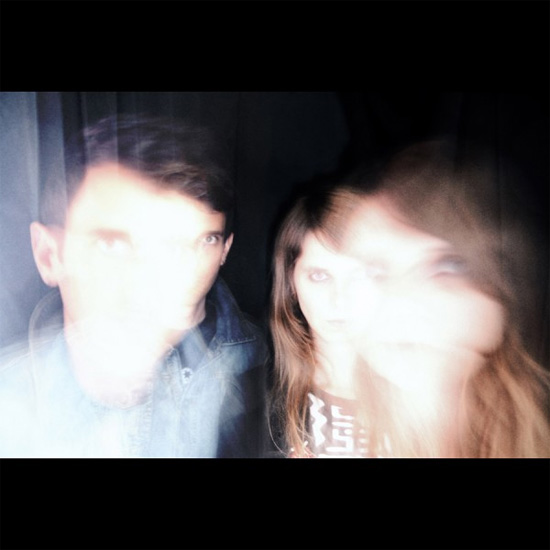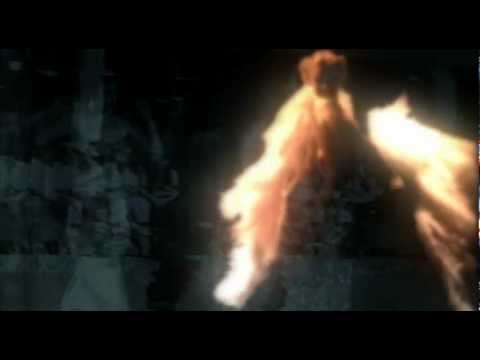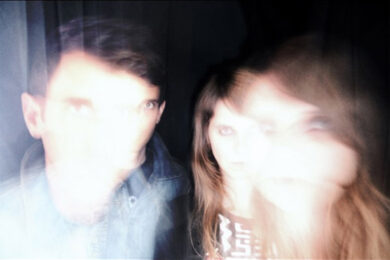I’ve never tried to suggest that the Rockfort column would be an exhaustive survey of French musical production, but it’s still galling at first to find out a few months after the fact that I’ve missed something that’s more than a bit good. Of course, it’s subsequently also rather pleasing, because it attests to the quantity of superb music coming out of France (therefore hopefully justifying the continued existence of this column), and also because, frankly, it’s never really too late for an unexpected treat. Before the rentrée hits, then, I want to point to a couple of releases from earlier in the year that initially passed me by but which are more than worthy of closer attention.
Cercueil already came up in the previous Rockfort column about Rêve, as fellow mainstays of the Dunkirk-Lille connection. One of the most positive things about the trio – Nico Devos and singer Pénélope Michel are the founders, but were joined by drummer Olivier before the first album proper ‘Shoo Straight Shout’ – is that, although appearing to draw in part on darker strains of 80s synthesised pop (although they’ve said in the past they’re more influenced by US groups like Matmos, Black Dice and Liars, and the name, which translates as ‘coffin’, was apparently chosen as a sort-of joke), they don’t adopt the fetishistic approach of many of the cold wave revivalists in France, the US and elsewhere, the obsessive recreation of period details. Cercueil are very much interested in being a modern pop group. ‘After Dark’, from second album Eurostrate, is a case in point. Its poise, the elegant arpeggios, symphonic synth chords and Pénélope’s anaesthetised Grace Slick delivery can easily transport you to some dry ice-filled 80s club of the mind but it doesn’t actually sound like a period reproduction, partly because the band’s palette is simply broader than that, from the interplay of the programmed beats with Olivier’s live drumming to Nico’s MBV-y guitar squalls.
Still, I’d hoped they’d free their sound up, push the textures further, and this is exactly what Nico and Pénélope have done on their self-titled debut as Puce Moment (the name comes from a Kenneth Anger short film). Pénélope talks about Puce Moment tracks being produced "in the shadows of Cercueil" but Puce Moment sounds like it is literally the shadow of Cercueil, or a ghost version; less defined, more suggestive. The sequence from ‘moonoom’ – like vintage 4AD semi-obscured by post-drone/noise fog before breaking into a clattering, tribal rhythm – to the menacing slow crescendo of ‘L’ombre’ is particularly stunning, but there are also breaks into dub, such as on ‘Video Dada’, and ambient curlicues on ‘Swinging Renaldo’.
Puce Moment has in fact existed alongside Cercueil for many years, with the former treated as more of a stage/live/visual project. The band have worked on a number of ‘ciné-concerts’ in the past: Ozu’s Tokyo Kids, Hou Hsiao Hsien’s Three Times, Lotte Reininger’s The Adventures of Prince Achmed, and have been touring with David Lynch’s Eraserhead, a ciné-concert that was created in 2012 and which was initially commissioned for an event themed around ‘le fantastique’ (which translates into English as ‘fantasy’ and sometimes ‘gothic’).
"We’ve also created the sound and images for our own ciné-concerts in a less conventional format," Pénélope Michel explains. "’Screw Divers’ was a performance during which Nico reworked video images from pre-existing films by superimposing them in layers. These video copies were very short loops of images still with the original soundtrack intact. The accumulation of sound created a sort of ‘noise’ which he then manipulated live. I joined the project later, adding cello to open up another layer of interpretation in the narrative. ‘Vidéo Dada’, an extract of which features on the album, is a project where the images we were ‘détourning’ were taken from videos from the 80s that were broadcast on MTV when it first appeared. While keeping the original sound from the clips, the editing and the arrangements allowed us to create an entirely new soundtrack. Along the same lines, we did a version ‘detourné’ of ‘All That She Wants’ by Ace of Base, slowing it down until it lasted 13 minutes. The arrangements we added considerably changed the tone of the track…
"For 2014 we’re working on a new project, La Lenteur, for which we’ve been able to find a number of different partners to help it see the light of day," continues Michel. "It’s a ciné-concert somewhere between a video installation and a performance which will have interactive elements and multi-projections. We’re filming the images, writing the music and working on the staging at the moment… and we’re starting to put it all together in the autumn, when we’ll be joined by another performer, Gaétan Rusquet… at the moment we can’t wait to see it all take shape! The first show will be in February at the Phénix national theatre in Valenciennes."
Why make the move to recording now?
"Maybe without realising it we were waiting for the right moment to embark on a first album," says Michel. "For years we’ve been juggling a number of projects alongside Cercueil, so above all it’s been that we’ve often been short of time to do it. The idea was to bring together work that we’d been producing in the shadows of Cercueil, to re-arrange them and set them out in a way that made for a coherent album. We managed to set some time aside for the Puce Moment album a little over a year ago and, in the end, we found we were incapable of going over old ground – apart from two or three tracks, the whole album was written from scratch. Our desire for something new and to move forward won out… and from there, the idea to perform the album live followed very quickly, and in spring of this year we reworked the tracks for the stage in such a way that we could have enough freedom in our playing and find pleasure in playing electronic music live. We also began thinking about the visual aspect, following on from the video and light shows we’d already developed with Cercueil."
The writing process is essentially the same for both, with Puce Moment having been viewed for a long time as a "laboratory" for Cercueil. "We write in the same way for both. With Cercueil there’s an extra stage at the end of the line where Olivier takes up the baton and writes the drum parts. In writing this first Puce Moment album and moving away from the original idea of compiling extracts from past productions, we realised that an entirely separate new group had been created. We obviously thought about releasing the album under the Cercueil name, but it seemed too different from the first two albums… we felt it necessary to keep the two projects separate, as our intentions in each case aren’t the same. Cercueil is more direct, whereas Puce Moment is more of the order of something ‘semi-conscious’. But all these projects feed each other, and as it happens making the Puce Moment album has allowed us to clarify our intentions for the next Cercueil album."
That album is set to appear next year, preceded by an EP in early 2014 and another trailer track on a compilation of unreleased material on their first label Optical Sound. There’s also the possibility of a 45 of Cercueil in ‘acoustic’ mode. "Last autumn, we went on tour with an acoustic version of Cercueil songs. Rather than being properly acoustic, though, it was more about more stripped down, minimalist re-arrangements of some of our songs. Sometimes the tempos were slowed, and there was only the electronic rhythms and an infrabass that acted like a heartbeat."
The band have had their own studio in Lille for around ten years, a dilapidated apartment which was formerly the exhibition space of a sculptor. "It’s our everyday working space, so it’s for private use. We’ve had some experiences in a studio with Cercueil, and it seemed important given the way we were writing the Puce Moment album to handle the mixing ourselves. We’re set up well enough to record our synths, guitar tracks and the voice. We’ve currently been working primarily on our own music but we’re going to start producing other artists, like the next EP from Rêve. If we need to play louder our make more noise, like for recording drums, we go to Dunkerque where my brother has his own studio. He’s part of a collective that rehabilitates hangars in the town’s industrial port to turn them into workshops – in fact we recorded the video for Cercueil’s ‘Jumping War’ in one of these buildings."
There are lots of independent acts combining shoegaze and cold wave in France at the moment (rounded up by Australian blog Sounds Better With Reverb in April) but you get the feeling that it’s more certain approaches the band feel a greater affinity with, than bands ploughing a particular furrow.
"For different and varied reasons, the initiatives of labels like Clapping Music or Optical Sound reflect a certain dynamism here and have very strong guiding principles… but their releases aren’t necessarily only for the attention of French listeners. We’re very happy to have joined the small family of the Tsunami Addiction label with this Puce Moment album, a label known for artists like Ddamage, Milkymee, La Chatte and Claude Violante. There’s also the Desire label, which is working with Tsunami Addiction on the vinyl release and which has a really bold catalogue that we’re still digging into but which has references that really speak to us… Lentonia Records are notable for promoting musical projects where there’s a strong feminine presence. In Lille, Alpage is a new label that Olivier is part of and which will soon be releasing his solo project DDDixie, but there are also people like Tamara Goukassova from The Konki Duet, Marklion (the solo project from Vincent Thierion). For a long time, we’ve also been fans of the parallel projects of Sister Iodine or the members of Bästard. A little while ago they released an album of Residents covers under the name Narcophony that we really liked."

F/LOR
To the list of labels with "strong guiding principles" like Clapping Music, Optical Sound, Tsunami Addiction and Lentonia should be added Prohibited, a genuine French indie pioneer reactivated in May for the release of F/LOR’s Blackflakes. Founded by brothers Nicolas and Fabrice Laureau in 1995 and modelled on Touch & Go and Dischord, it was initially an outlet for their band Prohibited which, after ten years of experimental, instrumental rock activity, made way for their new formation, the increasingly groovesome NLF3. In that time, as well as albums by the two main bands, the label has put out music by Herman Dune, Heliogabale and Purr, as well as Nicolas’s soft-psych side project Don Niño.
F/LOR is Fabrice Laureau’s own solo outlet, not quite making its first recorded appearance (a couple of sketchy essays under that name appeared on a Prohibited anniversary compilation) but the first concrete statement. Bassist in NLF3 but also producer, having worked with Dirty Three, Shannon Wright and Yann Tiersen, he turned out Blackflakes, the most purely electronic album to emerge from the label so far (in spite of NLF3’s increasing tendencies in that direction). It’s not exactly ‘dance’ music but it does seem to bear a tangential relationship to house on occasions, while occasional bass detonations on the title track recall jungle or dubstep. Laureau decides to interpret the question, about his album’s relationship to musique de boîte, a few ways…
"If by ‘boîte’ you mean ‘club’, dance music, then I’m not really a dedicated clubber," he reveals. "On the other hand, I’ve always been interested in electronic music, in its diversity, its evolution and the various currents in it. One things’s for certain, I like the effect of rhythms, grooves and repetitive music, whether its cold and minimal, complex and multi-layered or a bit wonky. I also love altering sounds through changing the pitch, saturation. I think that’s partly what gives the music I make its odd quality. I don’t really make music with the only aim of being a distraction, as entertainment – I also need to it to be able transport people. If it takes the listener somewhere and literally gets them moving too, then it’s a success!
"To play a bit with words," he continues, "if you take boîte in the sense of ‘boîte à rythme’ (drum machine) then I like the sound they make and when they’re used creatively, put through amps like with Big Black or mistreated, as with early Mr Oizo, but especially the fact that they offer the possibility of composing strange rhythms or patterns that are simply unplayable otherwise . The same for samplers and sequencers: these are pretty magical ‘boîtes’ (boxes) to play with and with which I like to have a sort of complicity."
So yes, Blackflakes is a boxes-and-knobs, back-to-analogue exercise (in fact Fabrice is happy to list his kit: "ES1, Su10, Su200, all with the original sounds replaced, some Casio keyboards (MT-70, VL-Tone) and a Korg (Sigma) as well as a number of effects pedals…"), with the sounds all culled from several short solo jams from over the years. But it’s also generally characterful, tactile, occasionally clumsy, playful, surprising and almost always charming. After a perhaps too-decorative opener, ‘Flat Snow’, it seems to go from strength to strength, from ‘Oloyo Danz’s nimble, almost-Brazilian rhythm to ‘Mutate’s grainy fluctuations, while all the while sounding like it’s built from logs, springs and rusty oil drums and held together by resin and discarded fan belts.
"The ‘clumsiness’ is perhaps down to the fact that I often played things separately on different machines that weren’t synchronised via a midi-clock or something similar," Laureau says. "It’s a way of humanising it in some way. The basis for a lot of the tracks is loops which haven’t been carefully calibrated. In any case, I don’t hesitate to make use of certain ‘accidents’. Aesthetically I like things that are rugged and more like a patchwork than something very finessed. Textures, energy, strange noises and surprise are all important. I found it more interesting to make an album by reworking these original recordings, where the riffs and the beats were already fairly clumpy, rather than to make something where the sounds were all clean and separated. So the tracks are sort of puzzles or giant collages, without any real compositional structure." (I disagree on the latter point, some of the tracks are very cannily structured indeed.)
Meanwhile, with Prohibited having awoken from slumber, a new NLF3 album is due next year, for which tracks have already been written "very spontaneously." The label is close to celebrating 20 years of existence, and the band’s previous EP Beast Me has, for Laureau, completed a sequence that started with 2008’s ‘Echotropic’ EP. "I see it," he says, "as the beginning of a new cycle."
Rockfort will be back in the autumn for the beginning of its own new cycle, enjoy the remainder of the summer and a bientôt.
For more from Rockfort, you can visit the official site here and follow them on Twitter. To get in touch, email info@rockfort.info.




